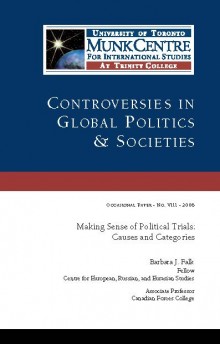By Barbara J. Falk
Political trials have been common in history, and have taken place in both consolidated democracies that respect the rule of law as well as authoritarian regimes. As concentrated legal narratives and expressions of political activity, such trials are neither entirely pejorative nor positive. They are microcosms of a specific political and cultural universe they seek to represent in concentrated legal form, and knowledge of context and the facts of each articular case are paramount. How then can such trials be analyzed and compared? The essay examines the current literature on political trials and argues against a single all-encompassing definition or typology in favour of a non-determinative list of criteria that illustrate how and under what conditions justice is politicized. Such a nuanced understanding of the range and type of factors that politicize trials is important because parallels between the Cold War and the current Global War on Terror indicate that such trials are not a feature of the remote past. Interpreting and applying the criteria suggested here would be helpful in order to recognize the processes of politicization, the didactic value of trials, particularly in situations of political transition.
